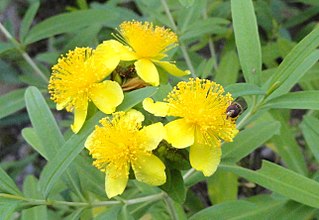
Hypericum is a genus of flowering plants in the family Hypericaceae. The genus has a nearly worldwide distribution, missing only from tropical lowlands, deserts and polar regions. Many Hypericum species are regarded as invasive species and noxious weeds. All members of the genus may be referred to as St. John's wort, and some are known as goatweed. The white or pink flowered marsh St. John's worts of North America and eastern Asia are generally accepted as belonging to the separate genus TriadenumRaf.

Triadenum, known as marsh St. John's worts, is a small genus of flowering plants in the family Hypericaceae. The genus is characterized by opposite, blunt-tipped leaves and pink flowers with 9 stamens. They are distributed in North America and eastern Asia.

Triadenum fraseri known as bog St. John's wort, Fraser's St. John's wort, and Fraser's marsh St. John's wort, is a perennial flowering plant in the family Hypericaceae that is grows in wetlands of the northeastern and northcentral United States and lower Canada. It is named after John Fraser (1750–1811), a Scottish botanist and widely travelled plant collector.

Hypericum ascyron, the great St. Johnswort or giant St. John's wort is a flowering plant in the family Hypericaceae.
Hypericum buckleyi, known as Buckley's St. Johnswort, is a rare species of flowering plant in the family Hypericaceae that is found only in the Appalachian Mountains of the southeastern United States.

Hypericum kalmianum, commonly called Kalm's St. Johns wort or Kalm's St. Johnswort, is a flowering plant in the St. John's wort family Hypericaceae. It is native to the Great Lakes region in the northern United States and southern Canada. Hypericum kalmianum was named after its discoverer, Swedish botanist Pehr Kalm (1715-1779).

Hypericum canadense, known as Canadian St. Johns-wort, lesser St. John's wort, and lesser Canadian St. Johnswort, is a flowering plant in the genus Hypericum. It is a yellow-flowering annual or perennial herb native to North America and introduced to Ireland and The Netherlands. The specific epithet canadense means "Canadian".

Hypericum prolificum, known as shrubby St. John's wort, is a deciduous shrub in the genus Hypericum. It was named for its "prolific" number of stamens.

Hypericum tenuifolium, known as Atlantic St. John's-wort and sandhill St. John's-wort, is a species of flowering plant in the St. John's wort family, Hypericaceae. It is native to the Southeastern United States.

Hypericum suffruticosum, known as pineland St. John's-wort, is a species of flowering plant in the St. John's wort family, Hypericaceae. It is native to the Southeastern United States.
Hypericum galioides, the bedstraw St. Johnswort, is a species of flowering plant in the St. John's wort family, Hypericaceae. It is endemic to the Southeastern United States.

Hypericum tetrapetalum, the fourpetal St. Johnswort, is a species of flowering plant in the St. John's wort family, Hypericaceae. It is found in the Southeastern United States and Cuba. It was first described by Jean-Baptiste Lamarck in 1797.
Hypericum myrtifolium, the myrtleleaf St. Johnswort, is a species of flowering plant in the St. John's wort family, Hypericaceae. It is endemic to the Southeastern United States. It was first described by Jean-Baptiste Lamarck in 1797.

Hypericum przewalskii, commonly called Przewalski's St. John's wort, is a flowering plant in Hypericumsect. Roscyna that is native to China.

Hypericum gymnanthum, the small-flowered St. John's wort or clasping leaf St. John's wort, is a species of flowering plant in the St. John's wort family Hypericaceae native to wet woods, bogs, and ditches of the eastern United States and Guatemala. It has been introduced to Poland.

Hypericum virginicum, the marsh St. Johns-wort or Virginia marsh St. Johnswort, is a species of flowering plant in the family Hypericaceae. It is native to the central and eastern United States and eastern Canada.

Hypericum frondosum, the cedarglade St. Johnswort or golden St. John's wort, is a species of flowering plant in the St. John's wort family, Hypericaceae. It is native to the central and southeastern United States in dry, rocky habitats.
Hypericum erythreae, the Georgia St. John's-wort, sparse-leaved St. John's-wort, or grit St. Johnswort, is a species of flowering plant in the St. John's wort family, Hypericaceae. It is native to the southeastern United States in seepage bogs and roadside ditches. Its name grit St. Johnswort comes from its limited distribution, within the Altamaha Grit region of the Georgia coastal plain.

Hypericum fasciculatum, known as peelbark St. Johnswort or sandweed, is a species of flowering plant in the St. Johnswort family, Hypericaceae, native to the southeastern United States. It is found from eastern North Carolina, south to southern Florida, west to eastern Louisiana. Kew's Plants of the World Online database also notes that it occurs in Cuba, though Cuba is not listed in several other sources. It was first described in 1797 by Jean-Baptiste Lamarck.

Hypericum tubulosum, the lesser marsh St. Johnswort or southern marsh St. John's-wort, is a species of flowering plant in the family Hypericaceae. Formerly classified as synonym Triadenum tubulosum, the species is found across the Southern United States and Midwest. It grows in wetlands such as bogs and floodplains.

















